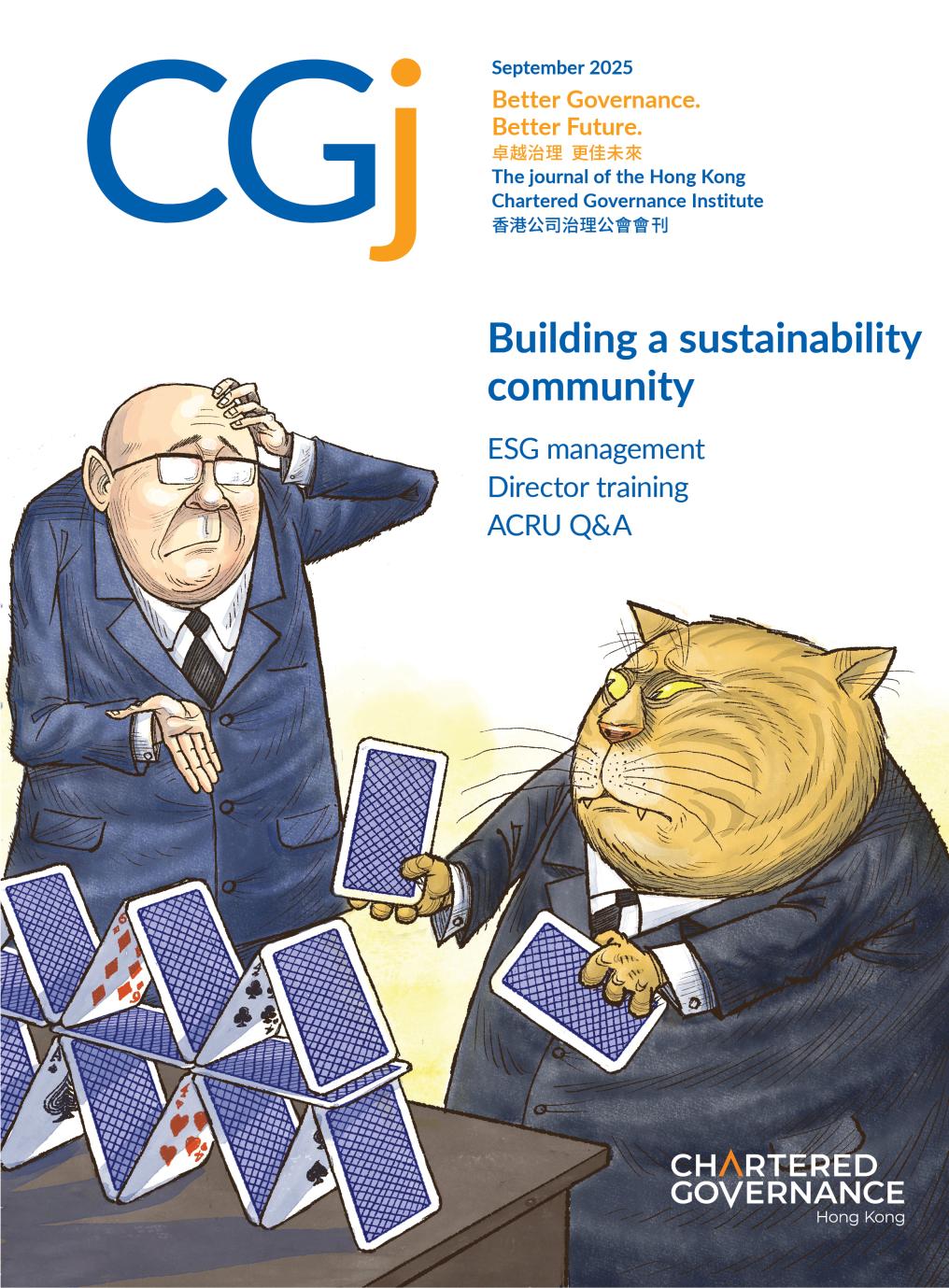
ACRU 2025 – thematic Q&A: part two
Government bodies and regulators address questions from participants following the Institute’s latest Annual Corporate and Regulatory Update (ACRU) conference to elaborate on their presentations. In part two, government bodies and regulators answer key questions on legislative changes, digital transformation and integrity management.
Company re-domiciliation regime
The Companies Registry responded to a couple of specific questions about documentation related to Hong Kong’s new inward company re-domiciliation regime under the Companies (Amendment) (No. 2) Ordinance 2025, which took effect on 23 May 2025.
What changes has the Companies Registry made to the form for Annual Return (Form NAR1) to facilitate the implementation of the company redomiciliation regime?
‘The Registrar of Companies has revised Form NAR1 – Annual Return. Among others, the statement in respect of the status of the company as a private company in section 16 on page 8 of the form has been revised to cover the situation of a private company that is a re-domiciled company. The notes for completion have also been updated to explain the date to which an annual return is made up for a re-domiciled company.’
Are there any transitional arrangements for the delivery of Form NAR1 to the Companies Registry?
‘You are recommended to deliver the annual return for registration using the most up-to-date version of Form NAR1. The Form NAR1 with Specification No. 1/2023 (December 2023) remains acceptable for registration on or before 22 November 2026, subject to any further extension on review. A re-domiciled company must adopt the new version of Form NAR1 (that is, Specification No. 2/2025 (May 2025)). The Companies Registry will return an old version of Form NAR1 if the company concerned is a re-domiciled company. Please refer to the thematic section on “Companies (Amendment) (No. 2) Ordinance 2025 – Company Re-domiciliation Regime” on the Companies Registry’s website for more information.’
Digital transformation
Digital transformation is a crucial area of governance in today’s increasingly interconnected world. The Digital Policy Office (DPO) of the HKSAR Government is leading the way in Hong Kong’s digital innovation and economy.
How does Hong Kong’s upcoming Digital Corporate Identity (CorpID) Platform compare with similar initiatives in other locations, such as Singapore? Will this platform be used in tandem with iXBRL filing in the future?
‘Singapore’s Corppass is the authorisation system for entities to manage the digital service access of employees who need to perform corporate transactions. Managed by the Government Technology Agency, Corppass enables businesses and other entities, such as non-profit organisations and associations, to transact digitally with government agencies and participating private sector services in a secure manner.
To further promote the development of the digital economy and create a business-friendly environment for Hong Kong corporations, the DPO is setting up its CorpID Platform to provide various functions – including corporate identity authentication, digital signing, pre-filling of forms, and storage of digital licences and permits – which will enable corporations to use online corporate identity authentication, digital signing and corporate signature verification in a secure, convenient and efficient manner when employing e-government services or conducting online business transactions, thus making the complicated procedures of submitting and verifying duplicate copies of related original documents, signatures and company chops redundant. Moreover, corporations will no longer be required to provide their corporate information every time they use a different online service, thus saving time and reducing the risk of human error.
In April 2023, the Inland Revenue Department (IRD) launched voluntary e-filing for profits tax returns, where taxpayers can file their profits tax returns together with supporting documents, including financial statements and tax computations, in the inline eXtensible Business Reporting Language (iXBRL) format on a voluntary basis. The DPO and IRD are now jointly integrating the CorpID Platform with the business tax portal, with a view to obviating the need to go through the current complicated paper-based procedures.’
What is the difference between CorpID and Hongkong Post e-Cert (Organisational)? Will CorpID replace the Post e-Cert to achieve the same purpose?
‘The CorpID Platform will issue a new corporate-based digital certificate to a corporation in Hong Kong, while the e-Cert (Organisational) is issued to an employee or an authorised representative of a corporation by a recognised certification authority in Hong Kong.
As long as an e-service supports the use of CorpID, corporations can use CorpID to perform digital signing in conjunction with the digital signing function of “iAM Smart”.
In addition, during our upcoming system design of CorpID, we will explore how the newly introduced corporate-based digital certificate by CorpID and other existing digital certificates, including e-Cert (Personal) and e-Cert (Organisational), can be suitably utilised to best meet the needs of different business scenarios, with the aim of providing a better user experience in corporaterelated government e-services, as well as in business transactions on the CorpID platform.
While the government is still transitioning towards using CorpID as its primary e-platform, users may continue to employ their existing digital function, for example, using an e-Cert (Organisation) in relation to e-government services, subject to the final approach of the relevant e-government service towards adopting CorpID.’
Can CorpID be used by Hong Kong incorporated or registered companies, and how can we address the issue of overseas directors or authorisation?
‘When the CorpID Platform is launched, it will initially provide services to all companies established or registered under the Companies Ordinance (Cap 622), as well as all businesses, such as sole proprietorships or partnerships, registered under the Business Registration Ordinance (Cap 310).
For directors or authorised representatives from the Chinese mainland or overseas, they can still use CorpID with a personal digital certificate issued by a recognised certification authority in Hong Kong, or a personal digital certificate mutually recognised by Hong Kong and Guangdong.’
Will partnership entities with multiple partners who have signing authority, such as CPA firms or law firms, be able to use CorpID?
‘We will examine and confirm the business requirements during our upcoming system design for different types of company established or registered under the Companies Ordinance and for all businesses registered under the Business Registration Ordinance.’
What will prevent CorpID from being stolen and used in an unauthorised manner, compared with a digital signature?
‘An authorisation mechanism will be implemented in the CorpID Platform such that the business owners or directors can authorise a designated member of staff, a company secretary or a third-party agent to be an authorised representative to conduct business services on behalf of the corporation. This will also apply to any intermediaries who provide services and need to sign on behalf of their clients.
The corporation will have to update its authorisation records as soon as there are any changes. The CorpID Platform will also provide notification functions to the business owners or directors, allowing them to stay informed of the status of CorpID. Subject to the final system design, we may also add an additional level of authentication to further ensure the authenticity of the person who is performing a critical transaction.’
Can we join the sandbox programme?
‘The DPO will launch a CorpID Sandbox Programme later in 2025 for corporations and government departments interested in supporting CorpID, to conduct proof-ofconcept testing and to develop their applications, with the aim of designing application scenarios and solutions that can better meet market demands. The DPO will promote the CorpID Sandbox Programme to various industries and invite companies to join.’
Integrity management
As is the Institute, the Independent Commission Against Corruption (ICAC) is a strong advocate of the vital role played by ethics and integrity in governance and organisational culture.
The ICAC’s Integrity Charters have achieved impressive results. Are there any challenges to taking the initiative forward and will it be applied to other industries in the future?
‘One major challenge is to promote the Integrity Charter to companies in specific industries in an effective way. Hence, we have partnered with market regulators, industry associations and major chambers of commerce to understand the needs and concerns of the industries in relation to integrity management matters, and to collaborate with them to promote the Charters, such as by coorganising launch events and briefing sessions, as well as by disseminating Charter information. Their support is one of the key factors in the success of the Integrity Charters. Looking ahead, the ICAC will continue to review the operation of the Charters and the market response, and will explore how best to promote integrity management in other industries in the future.’
Integrity management is crucial to good governance, but some listed companies – particularly small and medium-sized enterprises (SMEs) – may lack the resources to implement an effective integrity compliance management system (ICMS). What will the ICAC do to help?
‘Some of the ICMS components are already required by HKEX’s Corporate Governance Code or ESG Reporting Code, such as the establishment of an anti-corruption system and a whistleblowing policy, as well as the provision of anti-corruption training for directors and staff. Most listed companies should therefore have already adopted at least part of an ICMS. To help them adopt the ICMS, we will publish a practical guide and make available useful tools, such as sample policies and guidelines, and structured templates for risk assessment. Upon the launch of our guide, if individual companies need help, they can approach the ICAC for free, tailor-made advisory services. The ICAC will also organise relevant training for practitioners of interested listed companies.’


